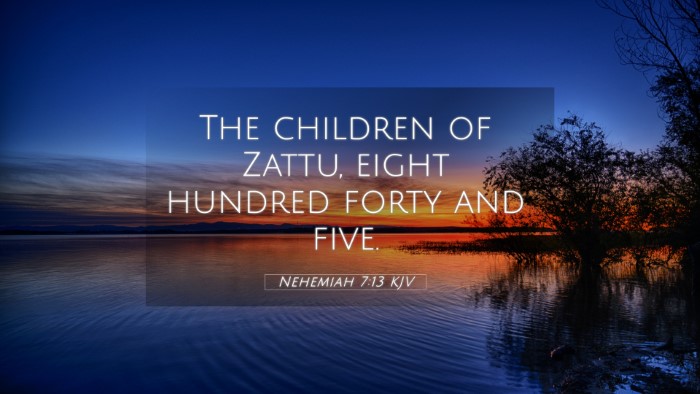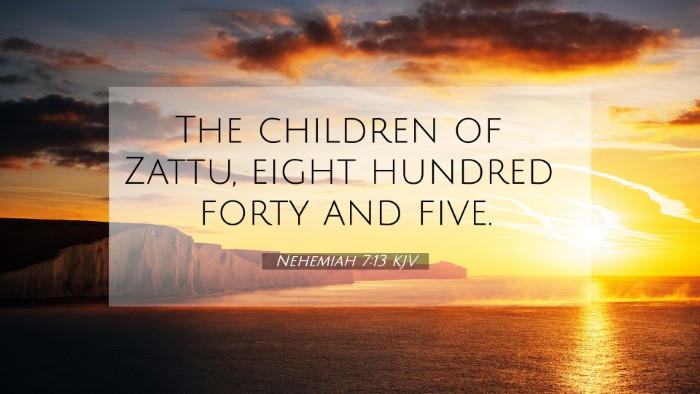Understanding Nehemiah 7:13
Nehemiah 7:13 states: "And the priests: the children of Joiada, of the children of Jeshua, nine hundred seventy and three." This verse provides a detailed account of the individuals who returned from Babylonian captivity and their roles in the religious community of Jerusalem.
Contextual Background:
In the book of Nehemiah, we find a narrative centered around the restoration of Jerusalem and the Jewish people after their exile. This chapter focuses on the genealogy and specific families that comprised the returning community, aiming to reestablish proper worship and civic structure.
Insights from Public Domain Commentaries
Matthew Henry's Commentary:
Henry emphasizes the importance of the priestly lineage, noting that the inclusion of specific families such as the children of Joiada and Jeshua signifies the fulfilling of God’s promise to restore worship in Jerusalem. He notes that preserving the genealogies showcases God's faithfulness and the continuity of the priesthood which is crucial for their religious identity.
Albert Barnes' Notes:
Barnes points out that this list of priestly families served to validate the community's legitimacy and their rights to worship. He highlights that the number of individuals underscores a significant return to the city, essential for the restoration of religious practices. The priests’ roles would be integral in guiding the people spiritually as they rebuilt the city and their lives.
Adam Clarke's Commentary:
Clarke elaborates on the significance of this verse by connecting it to other scriptural references. He reflects on how these genealogical records serve as a reminder of God's promise to Abraham and the continuity of the priesthood. This is a pivotal moment highlighting the divine orchestration of events for the reestablishment of Jerusalem.
Connections and Thematic Analysis
This verse highlights important themes within the Bible, such as:
- Restoration: The return from exile signifies a new beginning for the Jewish people.
- Identity: The genealogy strengthens the community's sense of identity and continuity.
- Faithfulness: God's unwavering promise to His people is emphasized through these records.
- Worship: The restoration of proper worship in Jerusalem is a paramount focus.
Bible Verse Cross-References
Nehemiah 7:13 relates to several other biblical passages, enhancing our understanding of its significance. Some key cross-references include:
- Exodus 30:23-24: Discusses the role and importance of anointed priests.
- Ezra 3:2: Mentions Jeshua son of Jozadak, linking to the priestly line.
- Ezra 2:36-39: Lists the groups of priests returning to Jerusalem.
- Malachi 1:6: Discusses the duties and honor expected from priests.
- Luke 3:36-37: References the lineage of Jesus, highlighting priestly heritage.
- Hebrews 7:14: Discusses Jesus coming from the tribe of Judah, contrasting old priesthood.
- Jeremiah 33:17: A promise of stability and continuity for David's descendants and the Levites.
Application in Today's Context
Understanding Nehemiah 7:13 is crucial for realizing the larger narrative of restoration and identity in the Biblical text. This verse invites us to explore how we relate to our spiritual heritage and the importance of continuity in worship and community.
The genealogical records in Nehemiah serve as a call to reflect on our own spiritual legacy. Just as the returning exiles had a role to play in restoring their community, we too are called to engage with our faith communities to foster restoration and worship in our contexts.
Conclusion
Nehemiah 7:13, while a detailed genealogical note, encapsulates profound themes of restoration, faithfulness, and identity in the life of spiritual communities. The cross-references draw a rich tapestry of biblical history, linking past promises to present applications, embodying a message that resonates throughout scripture.



